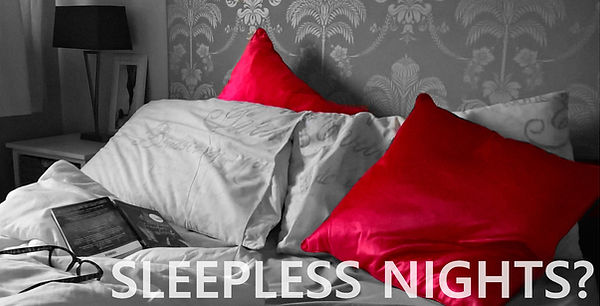Shiatsu for Insomnia
Are you tired of tossing and turning at night? Do you find yourself feeling frustrated because sleep just won’t come?
Using the principles of Traditional Chinese Medicine (TCM), I examine your sleep patterns to identify underlying imbalances. We take a holistic approach—treating you as a whole person—because sleep issues often involve both the mind and body. My goal is to address these imbalances and help you enjoy restful, restorative sleep once again.
There are many different types of Insomnia, do any of these resonate:
-
I can't get to sleep, my mind won't switch off
-
I fall asleep easily but wake up in the early hours* and it takes me a long time to get back to sleep
-
I sleep well but once I wake up that's it, I know I'm not going to get back to sleep again
It's exhausting, which leads to frustration. The more tired you are, the more emotional you become, making it harder to handle situations often increasing anxiety and your physical stress levels.
Let’s take a look at some of these types of Insomnia in some more detail and what sleep problems may be going on with you and how I can help you resolve them!
How can shiatsu help relieve insomnia?
In Traditional Chinese Medicine (TCM), your symptoms suggest a blockage in Gallbladder energy, often manifesting as tension in the neck and shoulders. Treatments such as Shiatsu can help restore this energy flow, calm the mind, and promote earlier relaxation in the evening. Supporting this with consistent sleep hygiene—especially getting to sleep before midnight—enhances overall restfulness, as the body’s organs follow a natural circadian rhythm known as the Chinese Clock.
For example, the Liver’s cleansing process peaks between 1–3 am. Deep sleep during this time is ideal, as the liver works more effectively when the brain is fully at rest. Waking during this period is common in menopause, chronic fatigue, or after heavy food and alcohol intake. The good news: these patterns can shift. Shiatsu works to rebalance the body, and when supported with diet and lifestyle changes, sleep quality can improve significantly.
Waking around 4 am often results from feeling cold, due to internal temperature shifts as the Liver cools down and the Lungs begin their process. This is natural—simply pulling up the covers helps maintain warmth during the coldest hours (typically 5–6 am). However, repeated exposure to cold can lead to morning stiffness, which simple exercises can alleviate by promoting Liver Blood flow.
A common challenge for those waking at 4–5 am is not being able to fall back asleep. This is often due to mental overactivity—worrying about tasks, responsibilities, or broader life stresses. Such mental agitation reflects and contributes to physical imbalances, creating a feedback loop between mind and body. In TCM, unprocessed emotions are believed to manifest as physical symptoms, and disrupted sleep is often a key indicator.
Shiatsu therapy for insomnia approaches each individual holistically—assessing symptoms, lifestyle, and emotional patterns to identify energetic imbalances. Gentle pressure on specific Acupoints helps restore balance, and targeted supplements can enhance this process. A key recommendation: Magnesium, which supports relaxation and deeper sleep.
Shiatsu is excellent for support in rebuilding your sleep health by relieving insomnia issues.

Andrea from Shiatsu Bodyworks Cheltenham recommends
Consider taking a magnesium supplement—about 400 mg per day. You can use tablets, or if you experience muscle aches, topical options like sprays, ointments, or magnesium flakes in a warm bath can be effective. Magnesium is easily absorbed through the skin, so foot soaks or massaging a magnesium-rich cream or body butter into areas prone to cramps or fatigue, such as the calves, can provide additional relief.
I wouldn't be without my Magnesium butter! You can purchase from me or try this one at Accidental Alchemy - The Sleep one.
If I wake in the night and can't get back to sleep easily I take an additional Magnesium capsule - it does the trick in minutes.
Magnesium in foods is important as it's an essential micro nutrient we don't hold onto so it needs to be taken every day. You can also look into eating more Mg rich foods such as :
-
Green leafy vegetables (e.g. spinach and kale)
-
Fruit (figs, avocado, banana and raspberries)
-
Nuts and seeds
-
Legumes (black beans, chickpeas and kidney beans)
-
Vegetables (peas, broccoli, cabbage, green beans, artichokes, asparagus, brussels sprouts)
-
Seafood (salmon, mackerel, tuna)
-
Whole grains (brown rice and oats)
-
Raw cacao
-
Dark Chocolate
-
Tofu
-
Baked beans
"Magnesium is involved in helping to regulate calcium, vitamin D3, blood sugar and hormonal balance, Low magnesium levels can lead to chronic fatigue-type symptoms such as low mood, anxiety, eye tics, insomnia, high blood pressure, muscle cramps (which can be due to low calcium too) and a poor tolerance to dealing with stress,"

